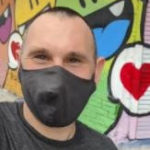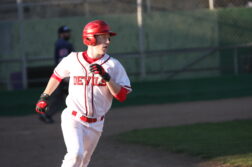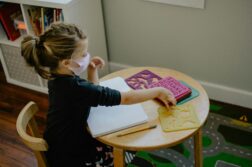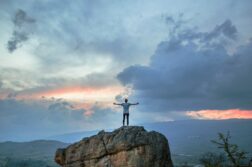I WAS four years old when the first article about HIV/AIDS was published by The New York Times titled “A Rare Cancer Seen In 41 Homosexuals.” It was July 3, 1981. I grew up knowing that AIDS was a horrible way to die, that it left people with sores all over their bodies, that they would waste away and become unable to care for themselves. I knew that gay men were disowned by their families and left to die alone.
AIDS was also hilarious, a winning punchline to every joke. Kids are terrible. “Good Christians” are worse, the worst people I have ever known. They preached that gays were getting what they deserved, a punishment from god for their wickedness. From Jerry Falwell to that asshole from Duck Dynasty, it’s still happening. We’ve come a long way, but it’s still a scary world for most gay and trans people.
I was five years old when I realized that I was gay. I was watching Friday Night Videos on our 13” black-and-white television in my mother’s bedroom. Suddenly, my mother screamed at me to turn the television off. I lunged at the television, and she continued shrieking until I turned the knob to off. I thought the electric cord had caught fire. But no. “What happened?” My mother explained that two men in the video were holding hands in the back of a car. I had seen that. She said that they were evil, perverts, “gay birds.” I was confused. I said that I didn’t understand, because I hold hands with Sean (my best friend) and that was okay. She said that it was different for adults. These men were gay. The word “abomination” is something every Christian kid learns early. And even though my mom thought it was different for boys and men to hold hands, I knew I’d be holding hands with men when I grew up. I still clearly remember being five and staring at the green glow that hovered on the screen after it had been turned off.
Around that same time, a man I didn’t know called on the phone. I answered, and he asked to talk to my mother. I didn’t know what gay looked like, and I definitely didn’t know what it sounded like, but I felt an immediate connection to this man based on his voice. There was something familiar and beautiful about it. My mother told him not to call again and slammed the phone down before telling me that he was a guy who she grew up with and he was gay.
So many of my gay tribe spent most of our adolescence trying to change everything about ourselves. This goes way beyond our desire to hold hands with other men. It was the way we walked, the activities we did, the clothes we wore, the music we listened to. I used to watch Tony Danza and practice the way he smiled and laughed. We studied masculinity and machismo then turned it into performance art. We put on their expressions and postures and we told jokes about faggots and AIDS. This became our ideal, the epitome of what we wanted to be and—because we couldn’t pray the gay away—with whom we wanted to have sex. Some of us adopted an identity that allowed us to escape ridicule. Others were tortured. I’d argue that most of us spent some time considering suicide. We absorbed everything we were taught by the people who hated us.
I was a great student. A gay guy lived on my street who carried a purse and had frosted hair. I was repulsed by him, while I worshiped the white trash straight guys that I spent most of my time getting high with. By the time I graduated high school, I’d convinced myself that I was growing out those gay feelings. I had girlfriends and I barely thought about my best friends while jerking off. That summer, I went to a music festival. It was grunge and punk and metal. And just as I was starting to believe that some day I’d have a wife and kids and a suburban house with a tire swing, I saw Brian Grillo. He was … well he was everything. He was the lead singer of Extra Fancy, a band that felt like a cross between the B52’s and the Buzzcocks. He wore tight cut-off jean shorts with combat boots—very 90s. His head was shaved. He was muscular and covered in sweat as he banged on a giant steel tub. He looked like a skinhead but he was singing about being gay and having AIDS. I didn’t know there were gay men like this. I started coming out the next day.
The night I came out, I was homeless. When kids come out and end up on the streets, they have to do whatever they can to survive. It has long been known that LGBT kids make up a disproportionate share of the homeless youth. While about five to ten percent of young people are thought to be gay and/or trans, they make up twenty to forty percent of the young homeless population. And the average age they become homeless is approximately thirteen or fourteen years old. They aren’t old enough to get a legal job. These adolescents are homeless because they’re hated, and they are my heroes. I think they are about to change the world.
The generation of influencers and kids who were never told “No” is about to enter adulthood. They’re queerer and more out and more accepting than any previous generation. I welcome a generation that cannot fathom that when I was their age, it was illegal for me to have sex with other males or to marry my partner. I welcome a generation that does it all while taking selfies. I argue that they embody the spirit of the gay and trans people of the early 80’s, the people who dared to leave everything behind to live in big cities and dance until dawn. They were brave and defiant and fabulous.
As we recognize the 40th anniversary of that first article about a rare cancer seen in 41 homosexuals, it is impossible to calculate the loss. We lost brilliant minds, artists, musicians, designers, organizers, demonstrators, lovers, and friends. When I think about them, I wonder where they would be tonight. I like to think they would be gathered in groups of old friends, sitting on barstools, laughing about old times and watching the next generations of gay and trans kids dancing in front of mirrors. I like to think they would be proud of those of us who followed them, working to support organizations that really did make some amazing progress on things I never imagined I would see in my lifetime. I hope they would think we’ve done enough, that I’ve done enough.
 Brandon Snead is a Recreational Thearpist and Instructor at Temple University’s College of Public Health. He is passionate about using recreation to support well-being and goal attainment. His work is focused on encouraging people with mental health challenges to use enjoyable activities to enhance holistic health and to foster wellness-based identities. He uses his own recreation time to explore, gawk at art (@lifeinphilly on IG), bike, write and laugh as much as possible. brandonsnead@temple.edu
Brandon Snead is a Recreational Thearpist and Instructor at Temple University’s College of Public Health. He is passionate about using recreation to support well-being and goal attainment. His work is focused on encouraging people with mental health challenges to use enjoyable activities to enhance holistic health and to foster wellness-based identities. He uses his own recreation time to explore, gawk at art (@lifeinphilly on IG), bike, write and laugh as much as possible. brandonsnead@temple.edu






